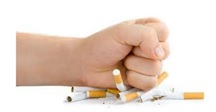
Did you know that research has confirmed smoking has a direct causal effect in the following health conditions?
- Cancers of the lung, throat, mouth, tongue, nose, nasal sinus, larynx (voice box), oesophagus, pancreas, stomach, liver, kidney, bladder, ureter, bowel, ovary, cervix, and bone marrow (myeloid leukaemia). Smoking-related cancers accounted for about 13% of all cancer cases in 2010.
- Heart disease – Around 30% of all cases of heart disease in those under 65 years are due to smoking.
- Chronic obstructive pulmonary disease (COPD) includes emphysema and small airways disease. Emphysema is rare in non-smokers. COPD includes emphysema and small airways disease. Emphysema is rare in non-smokers.
- Chronic bronchitis is a recurring cough together with frequent and increased phlegm. It occurs in about half of all heavy smokers.
- Stroke – Smokers under 65 years are around three times more likely to have a stroke than non-smokers of the same age.
- Peripheral vascular disease is a narrowing of the leg arteries that can lead to blockage and, in some cases, amputation. Cigarette smoking is the main risk factor for this disease.
- Abdominal aortic aneurysm (AAA) is the bursting of the lower part of the aorta leading from the heart. It often leads to sudden death. Cigarette smoking is the main preventable risk factor for this disease.
- Type 2 diabetes, and higher risks for diseases associated with diabetes in people with Type 1 or Type 2 diabetes.
- Peptic ulcer disease in persons who are Helicobacter pylori positive.
- Eye diseases, such as macular degeneration and cataracts.
In light of the above, one would expect that giving up smoking should be a “no brainer”. BUT, there are all the excuses – “I enjoy smoking” or “It’s my time out” or “I’ve tried so often but just can’t kick the habit” or “I can’t deal with the withdrawals” or “the stop smoking programs are too expensive” …… the list is endless.
However, if you REALLY want to kick the habit, there are effective and safe options that are also very cost effective. Especially, when you consider the cost of cigarettes and tobacco in Australia.

Tried before?
You have tried to quit smoking before. You have tried nicotine patches? You have tried nicotine inhalers? You have tried medications? You may even have tried going ‘cold turkey’. There are reasons why these methods often fail – there is absolutely no support for your body and what happens as the nicotine clears from your system. In order to successfully stop smoking, supporting the body in clearing the toxins while helping avoid withdrawal symptoms is essential.
There are remedies that may help to curb the cravings. Coupled with a gentle but effective detoxification and stress-management program, success is virtually guaranteed. “Virtually” only because it depends on you really wanting to stop.
What happens in your body when you quit?
- 20 minutes after quitting your heart rate & blood pressure will decrease & circulation will start to improve.
- 8 hours after quitting the nicotine in your bloodstream has decreased by over 93%.
- 2 days after quitting your sense of smell & taste are improving. Irritabilities & anxiety begins to decrease.
- 3 days after quitting symptoms of chemical withdrawal begin to decrease.
- 4 days after quitting breathing becomes easier & your lung function begins to improve.
- 2-4 weeks after quitting the psychological effects of withdrawal have now stopped.
- 1 year after quitting the risk of heart attack, stoke & coronary heart disease drops to half of that of a smoker.
- 5 years after quitting your risk of stroke & adult onset diabetes is now that of a nonsmoker.
- 15 years after quitting the risk of coronary lung disease is now similar to a person who has never smoked.

Are you ready to quit? Don’t wait any longer and stop making excuses.
If so, call True Medicine on 07 5530 1863 to arrange your appointment. Call now and start regaining your health and avoid serious disease.
